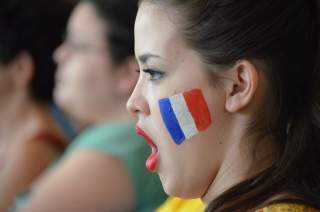France's Dubious Choices
No matter which way the election goes, France is headed for a pretty dispiriting outcome.
At first blush, the results produced by Round One of the French presidential election, which took place Sunday, might look somewhat like a repeat of the 2016 U.S. presidential election. French voters roundly rejected traditional political candidates and the parties behind them, and went for two outsiders.
On the one side, we have a socialist front-runner, Emmanuel Macron, who was all but endorsed by former President Barack Obama. He recently founded his own political party, En Marche!, which has no seats in the French National Assembly. Macron, who has never held elective office, pulled in 23.7 percent of the vote.
On the opposing side, we have the right-wing, populist Marine Le Pen, leader of the National Front. She has been widely criticized—and in some quarters ostracized—for her anti-immigration views. The closest runner up, Le Pen garnered 21 percent of the vote.
The winner of the May 7 face off will govern France for the next five years, taking the country in one of two entirely opposing directions.
Macron is an internationalist, highly pro-EU. In fact, he has called Brexit—the British vote to exit the European Union—a crime and predicted that the Brits will lead lives of servitude.
Le Pen is a protectionist. She is also bitterly anti-EU and wants to follow Britain’s example.
Superficially, and some U.S. media have been reporting it as such, one might see a Clinton versus Trump lineup repeated in France. Yet differences are more profound than similarities between the two elections, and nuance is important when looking at politics across the Atlantic Ocean.
Early polling suggests that Macron will win big in May, potentially with more than 60 percent of the vote. However, we all know only too well that pollsters can get it wrong. But Emmanuel Macron is no Hillary Clinton. He does not have Clinton’s scandals and heavy political and personal baggage to weigh him down. Many American voters, though not completely enamored with Donald Trump, voted for him because they felt Clinton was simply unacceptable.
Unlike Clinton, Macron has limited political experience. The telegenic, thirty-nine-year-old economist served briefly in the government of outgoing French president Francois Hollande, a member of the Socialist Party. While a protégée of Hollande, Macron has shown a distaste for political labels and styles himself as an outsider. He has called for reinventing the French political system and is currently trying to develop more centrist appeal.
Marine Le Pen, the daughter of French nationalist Jean-Marie le Pen, meanwhile, hardly compares to President Trump. Trump himself muddied the waters by predicting in one of his ubiquitous tweets that the Paris shootings would have a “big impact” on the French election. That did not exactly happen.
In terms of economic policy, Le Pen is a statist and protectionist. She is vigorously anti-immigrant, anti-EU, anti-NATO and has received the financial support of the Russian government.
Furthermore, while Le Pen has moderated her rhetoric somewhat, the National Front is a far cry from the Republican Party. Among her supporters, anti-Americanism runs deep, as does Holocaust denial. Were Le Pen to win, Europeans would most certainly consider France a pariah nation.
Americans are used to a binary choice in their political elections, Republicans versus Democrats. You are either in favor of one or the other. (The 2016 U.S. election was an anomaly in so far as Trump crossed party lines to appeal in populist terms to working class voters of both parties.)
In Europe, however, parliaments have more parties, and the political landscape gets more complex. Choices can range from Communists and radical Socialists to Social Democrats, libertarians, mainstream Conservatives, Christian Democrats and far-right nationalists.
This time around the French are looking at two dubious choices. No matter which way the election goes, France is headed for a pretty dispiriting outcome.
Helle Dale is The Heritage Foundation’s Senior Fellow in Public Diplomacy studies.

